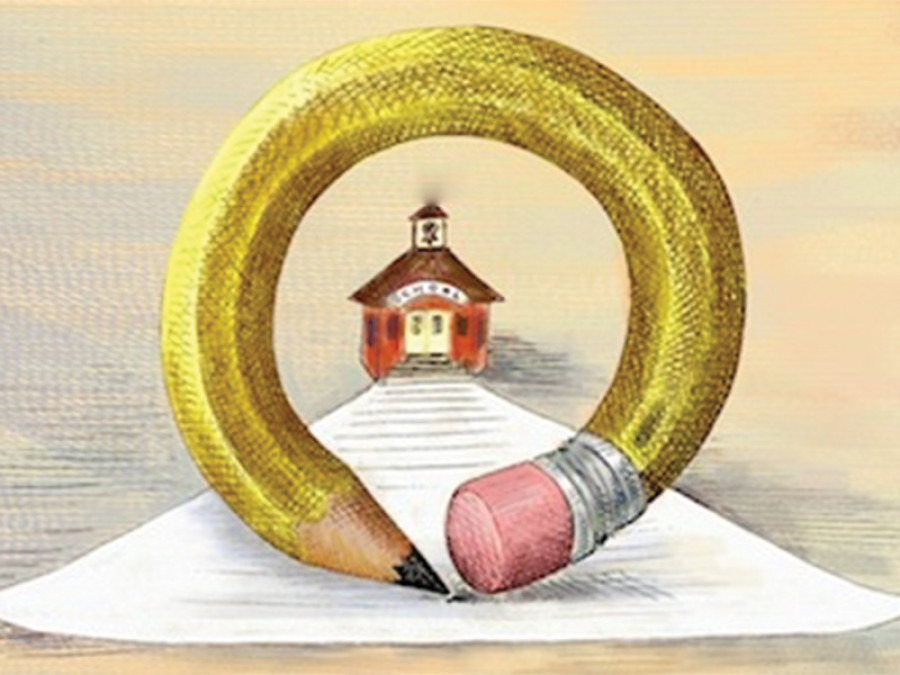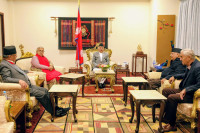Opinion
Still a lot to learn
Higher Secondary Education Board should reevaluate its working methods
Chiranjibi Niroula
Higher Secondary Education Board (HSEB) recently published the results of grade XI, three months past its deadline. Like previous years, the results did not meet the expectations of the students or parents. More than one-half of the regular and about two-thirds of the exempted candidates failed. Moreover, had HSEB published the results on time, the unsuccessful ones could have had enough time to prepare for their back papers. Nevertheless, it is imperative to investigate why so many students have failed in the first place. There are several reasons behind it; HSEB alone cannot be blamed for it, but it cannot be left off the hook either. It should look into the matter and find ways to improve the results in the future.
Parents need to be more involved in their children’s education. Of course, the role of the schools and teachers is pivotal when it come to students’ education. But the role of parents is equally important. Parents should inquire about the faculty, school executives and past academic performance of the school. For equipping students well, the tripartite relationship between the school, students and parents should be warmly enhanced, which can happen if and only if parents shoulder part of the responsibility. Especially when children are in college, parents need to be more alert. It is necessary for them to be in close contact with the college and the teachers so that they are constantly aware of their children’s performance.
Striding Ahead
New techniques and strategies in the field of education are emerging and spreading globally. But most of our educational institutions are still blindly following decades-old courses. The HSEB is not an exception. Some of the subjects have unnecessarily long courses and need to be upgraded. Besides, various subjects “offered” by the HSEB are not actually taught. Most of the schools offer only a limited number of subjects. Despite the fact that there is the provision of multiple subjects from which the students can choose, many of the subjects are not available in reality. Thus, HSEB should encourage and support schools to offer multiple subjects such as in A-levels and International Baccalaureate programmes.
Furthermore, the existing 150 periods allotted for theoretical subjects of Plus Two programmes are not enough to complete the course on time. It pushes the respective faculty to run the classes at a breakneak speed to meet the target. So it would be better if students were allowed to enroll in Plus Two programmes as soon as they finish their SLC exams, on the basis of their marks in mock exams. This will not only extend the operating days of the schools but also enhance the students’ academic accomplishments.
Another pressing issue is that a number of schools do not enroll a limited number of students, but as many SLC-graduates as they can lure. Some of the schools keep more than 50 students in a class and run a single class period for 40 to 45 minutes, even though HSEB prescribes a classtime of 50 minutes for each subject. Because of large number students, the teachers cannot give proper attention to them. Hence, HSEB should inspect and supervise the affiliated schools on a regular basis. The class size should be limited to less than 40 students.
Above all, HSEB should keep the affiliated schools in confidence and create a system that allots 20 to 25 percent internal marks in each subject for the final evaluation of the students. But this system should contain a monitoring unit similar to the one HSEB employs to monitor the practical examinations in the existing evaluation system. There are many faults in our country’s education system, but it is imperative to address them gradually. “Education,” to quote Nelson Mandela, “is the most important weapon which you can use to change the world.” Let our students be part of that change.
Niroula is programme coordinator at GEMS HSS




 7.12°C Kathmandu
7.12°C Kathmandu











